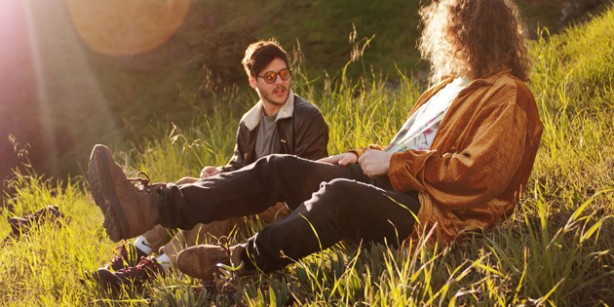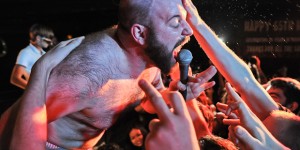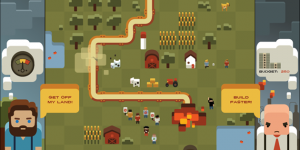 Music
Music
Q&A: Wavves are more than just teenage dirtbags, baby
by Mark Teo
May 20, 2013
Even knowing he’s notoriously short around journalists, at a recent Toronto tour stop, I ask Wavves leader Nathan Williams about how he’s dealing with his anxieties. He responds by wagging his beer bottle before talking a giant swig. He’s never been one to hide his taste for mind-altering substances, but he’s at his most honest (and, perhaps, arresting) on Afraid of Heights, his fourth LP proper.
Even knowing he’s notoriously short around journalists, at a recent Toronto tour stop, I ask Wavves leader Nathan Williams about how he’s dealing with his anxieties. He responds by wagging his beer bottle before talking a giant swig. He’s never been one to hide his taste for mind-altering substances, but he’s at his most honest (and, perhaps, arresting) on Afraid of Heights, his fourth LP proper. Unlike the lo-fi garage pop of Wavvves and the beach-ready pop-punk of his 2010 breakthrough, King of the Beach, Afraid of Heights doesn’t charm with its addictiveness; it might, in fact, be Williams’ least consistent album to date. Its experiments in big-band dynamics and Cobain ‘n’ Cuomo hero-worship don’t always hit their intended targets.
Afraid of Heights isn’t an uncut serotonin rush, but maybe that’s the point. The defining themes of their earlier work—aimlessness, boredom, and being a fuckup—have evolved beyond teen-trash territories: Afraid of Heights has Williams and co-songwriter Stephen Pope writing their most personal work to date, exploring social anxiety, depression, and insecurity. We spoke with Williams and Pope over beers at Toronto’s Horseshoe Tavern to discuss the newer—and decidedly less neon—shade of Wavves.
AUX: You like to razz Fucked Up’s Damian Abraham on Twitter. Is he taking you out on the town tonight?
Stephen Pope: Well, last time we were here, he was like, “I’m going to take you to my favourite restaurant!” And he took us to, like, McDonalds, where he went and ordered two Big Macs, two large fries, and then went for poutine later.
Nathan Williams: He’s sending his drug dealer down here. He said to look out for a guy who was him at his fattest—plus 120 pounds. He should be coming soon.
On the topic of being greened out, you’ve also mentioned that you hate being called slackers—but don’t mind being called losers.
SP: Well, “slacker” implies that you’re lazy and you don’t do anything. But we’re extreme workaholics. We spent 15 hours a day last year in the studio working our asses off. I mean, we’re not slackers, but we’re definitely drunk losers.
NW: But we chose a career where we can be drunk losers and still work. Like, if we weren’t able to work and record, John [Hill, a pop producer who’s worked with Rihanna and Santigold] would kick us out of the studio. But thankfully, we were able to get our job done while fucked up.
So, John was cool with you being messed up in the studio?
NW: I’ve written songs with John for other artists. [As well as Williams’ murky hip-hop project, Sweet Valley.] He’s kind of a mean guy, so we’d fuck around with him. And I mean, he drinks, too. He’s kind of an alcoholic. No wait, don’t put that in the interview.
SP: Yeah, he’s not an alcoholic. But he likes to drink. And I’m more trusting of people who consume.
Because non-drinkers can be judge-y sometimes.
NW: Well, even if you’re not being judged, people who don’t [drink or do drugs] have the wherewithal to avoid it. I don’t know if I’m jealous of them or just can’t get to their level.
Let’s talk Afraid of Heights. You recorded it before landing on Mom+Pop and after you left Fat Possum. What was it like being momentarily free of a label?
NW: It’s the difference between having a boss and not having a boss. And it’s great!
SP: Yeah, you don’t have to respond to anybody. If you have a label, they’ll be like, “OK, you have three months to record. If you go over, it’s coming out of your pocket.” A label probably would’ve dropped us [while recording Afraid of Heights]. Without a label, we were really able to take our time and really get out what we wanted from the record.
NW: But that’s a risk too. We could’ve totally fucked ourselves if we put out a record that nobody wanted. I’d be broke. Well, actually, I’m just broke anyways.
SP: Still, we just had time to do whatever we wanted to do.
NW: Yeah, we ordered instruments and waited two weeks to get them off eBay, just because we liked the way that they sounded. We waited days or weeks or months to find different guitar tones, amp combinations.
NW: We really like this one pedal called Swollen Pickle, it was what Billy Corgan used on Gish.
People are bringing up the Pumpkins, Weezer, and In Utero influences on this album. Are there influences you think everyone’s missing?
NW: Y’all like Wheatus? “Teenage Dirtbag” has inspired everything I’ve ever written.
Honestly, that song’s kind of the jam.
NW: It is kind of the jam. We weren’t joking about it. We were blasting it in the van the other night.
When it comes to Wavves, though, you’ve moved beyond being teenage dirtbag territories. Like, people are calling Afraid of Heights mature.
NW: I don’t feel mature. Do you?
SP: No. But the way we conducted the business of the record…. We took a risk without having a label. We did it ourselves, I guess that’s pretty mature. We risked everything.
NW: I still feel pretty immature though.
The lyrical content on Afraid of Heights isn’t. There’s a real sense of defeatism on the LP—what kind of headspace were you in when you were writing it?
NW: I guess we were defeated. We were in a weird, strange headspace. We basically didn’t talk to anybody for a year.
SP: We were locked in a dark room all day every day for a year. That probably has an effect on your psyche.
NW: We’re also not used to being in one place for a long time after touring. We were essentially living as nomads for so long. So to stop and concentrate on one thing—while going nowhere—made me feel immediately manic. I felt bipolar or something. It’s like I didn’t know what to do with myself.
SP: Any social skills I had were so far gone. I think that affected the writing a lot, just being scared of interacting with people.
Well, how do you deal with interviews like this one?
SP: We’re scared of these things. We have a song called “Paranoid” for a reason.
NW: I’m probably a little bit shy to express some of the… more serious issues in my life, I suppose. It’s difficult and confusing, and things are just getting worse. Things definitely have started to snowball over the last few years—and depression, relationships, death, substance abuse.
Speaking of substance abuse, it seems to be intertwined to your music. So, for you, is art-making inherently self-destructive?
NW: Well I was doing drugs way before I started music.
SP: You have to be a fucked up person to try to make money doing art. I mean, it’s such a long shot [that you’ll succeed]. But [substances] help and they hurt. It opens up your mind to other views. But if you get way too drunk, then you get nothing done.
NW: I’ve definitely ruined sessions on this record. I wasted days, where I’d just skateboard to the bar across the street waiting for it to open. Or I’d go to the liquor store to buy King Cobras to drink in the booth.
So it was a fine line between being functionally drunk and being drunk drunk.
NW: Yeah, it was a fine line. We got different things out of it. There were some nights that were so drunk, we’d never remember what we’d done. We’d listen back to takes, and be like, “What the fuck! This is terrible!” Or like, “Wait, this is actually kind of good. Let’s tweak it a little.” We stuck mics in pianos and stuff, recording when we hit piano strings. It was terrible.

This article originally appeared in the May 2013 Issue of AUX Magazine.
Download and subscribe for free in the app store.
Tags: Music, Interviews, Damian Abraham, Nirvana, Smashing Pumpkins, Wheatus





